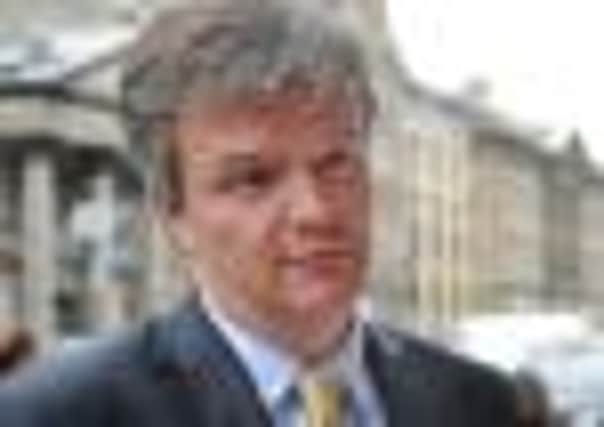Michael Moore adds voice to claims independence referendum causing investment ‘uncertainty’


He also said the referendum has had no impact on future decisions about defence spending in Scotland or on Edinburgh’s bid to host the Green Investment Bank, a UK Government renewables investment project.
Mr Moore was speaking at a visit to Babcock International in Rosyth, which is building two Queen Elizabeth-class aircraft carriers.
Advertisement
Hide AdAdvertisement
Hide AdHe called Babcock “a forward-thinking company” with the capability to develop beyond the construction of the new carriers.
However, he said an independent Scotland would not be in “the frontline” of future UK defence contracting and that it is “unlikely in our lifetime” that there will be anything as big as the two carriers again.
Mr Moore went on: “But there will still be ships to build and there will still be a lot of defence spending, as we see in Edinburgh at Selex Galileo and as we see in Fife with Raytheon.
“As part of an integrated UK defence force and UK defence budget, Scotland is right at the forefront of all the opportunities to bid for that.
“Of course it would still be able to be part of the contracting processes but it would be doing so as an independent country, bidding for overseas work essentially, rather than as part of the home nation and able to be in the frontline for those bids.”
Mr Moore said Mr Osborne’s statement about the referendum “confirms what I and others have been saying for weeks”.
He added: “It’s not just what we have been saying. It’s about what people like CBI Scotland have very firmly put on the record and the concerns raised by Citigroup in their report on renewables three weeks ago.
“There is no escaping the fact that the uncertainty over the future place of Scotland, within the UK or outside it, is one of the factors that businesses are taking into account as they make forward-investment decisions.”
Advertisement
Hide AdAdvertisement
Hide AdHowever, he said he is “not giving individual names” of companies. He said: “As the Chancellor said, these are private conversations with serious business people in different parts of the country and elsewhere.
“We hear others suggest that this isn’t a factor. Well, the evidence is out there already and I believe it will grow.”
Mr Moore said the referendum has not been a factor in Edinburgh’s bid to host the Green Investment Bank.
He said: “In the same way that we are spending millions of pounds on defence in Scotland, that is all done on the assumption that we are strongly assured that we are going to continue within the UK.”
Yesterday Mr Osborne said “uncertainty” about an independence referendum “is damaging investment in Scotland”.
But his comments were challenged by Finance Secretary John Swinney.
Mr Swinney said: “That Mr Osborne can’t name a single company is telling. In stark contrast, the long list of companies and organisations criticising his oil tax hike shows just how much damage has been caused by the destabilising effects of his tax raid on the North Sea.”
Michael Pettigrew, managing director at Babcock’s Rosyth marine division, said Babcock is “apolitical” on independence.
Advertisement
Hide AdAdvertisement
Hide AdHe said: “Babcock by its very nature serve a number of government sector bodies. It’s never going to have a political opinion.”
He said Babcock’s future beyond the carriers could lie in renewable energy projects, or in decommissioning nuclear sites.
He said: “The future of Rosyth for most of this decade will be aircraft carrier-driven. Beyond that, because it’s such a fantastic facility with an undoubtedly capable workforce and highly productive workforce, it will have opportunities in its existing markets but also alternative markets such as operations and maintenance of offshore renewables, modular builds for high-integrity markets such as nuclear, new-build and decommissioning, as well as a number of other markets.”
Mr Pettigrew said Babcock would only be interested in decommissioning UK nuclear facilities.
He added: “But you never know. If we’re good at it, we know how to decommission a site.
“This entire site was a nuclear site and still is. We decommissioned this to a standard that is way, way better than anything required under international law or nuclear licensing. It’s an unsung success story really.”